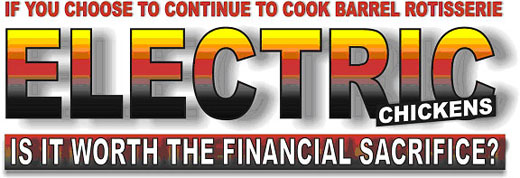
|
|
We suggest you contact your local council to determine when these new requirements will come in force in your area.
|
From January 2005, the Southern Sydney Regional Organization of Councils, Waverley Council and the EPA will begin to implement a unique initiative to reduce food odour, smog and the associated residue problems that come with a variety of fossil fuel types. In other words, food outlets that rely on charcoal, wood or other similar fuel types could shortly be required to comply with stricter council regulations and requirements according to new guidelines currently being set down by the EPA. |
|
|
|
In future, the sellers of these foods will need to ensure that the associated minimum maintenance of the cooking equipment used adheres to the new regulations and the increased cleaning requirements.
These new guidelines will ensure that all cooking methods and associated equipment operating with solid fuel such as charcoal, wood or other fossil fuel types will necessitate more frequent cleaning than other cooking methods, with a more stringent adherence to the processes used in the cleaning of filters, exhaust systems and other associated odour control methods.
|
|
An important part of this new EPA guideline is that approved mechanical ventilating cleaning companies will be required to undertake the nominal periodic cleaning and maintenance. The food vendor will also be required to create and maintain a pre-planned maintenance log.
|
|
|
One only needs to spend a few minutes talking to a service technician, or an existing or former owner, to appreciate the shortcomings of electric and gas type barrel rotisseries. In this short report we have isolated the most common gripes and challenges brought to our attention.
|
|
The operator quickly learns that due to the high levels of cleaning requirements, maintenance and other factors, they realize they may need more than one machine due to the downtime experienced. Two machines bring the cost of Barrel Rotisserie machines in line with the price of a Radiant 2000™ without the obvious benefits the Radiant provides. There are no elements to be replaced on a regular basis or regular maintenance requirements with the Radiant due to its superior construction. Even after 10 or 12 or more hours of cooking on a Radiant, clean down time is just a tiny 10-15 minutes.
|
Barrel Rotisseries cook at around the same temperature as a domestic oven, but in larger volume. Therefore the same shrinkage problems that are experienced in a home are also experienced with these machines. Moreover, slow cooking tends to burn off natural juices and suck in the natural fat resulting in a dry breast. The Radiant burns off the fat and seals in the natural juices due to cooking temperatures of around 500 degrees C resulting in the lowest shrinkage of any machine. In our seminars we buy Barrel Rotisserie and Charcoal cooked chickens and encourage the attendees to do their own weight test. All agree the Barrel Rotisserie chickens are the lightest of the lot due to the high loss of natural juice.
|
| Barrel Rotisseries are expensive to operate as they primarily heat the air which in turn then cooks the product. A less than full canister increases the production cost per unit cooked substantially as more air needs to be heated to cook less product. Other factors such as dirty or soiled machines, build up of chicken fat and the carbonating (blackening) of the surface further increase operating costs. Furthermore, spits cannot be added once the cooking process commences as this would cross contaminate the contents and may result in food poisoning. |
|
Radiant can do everything the Barrel system cannot do at a fraction of cost and in far less time. In fact we suggest that any Barrel Rotisserie operator who cooks around 150-200 chickens a week is better off financially paying off a Radiant 2000™ on a finance package because of the high production cost of the electric or gas Barrel Rotisseries. Then if you add the savings in labour, time and other related factors that come with operating with a Radiant 2000™, the financial benefit to the operator becomes even more substantial.
|
| |














